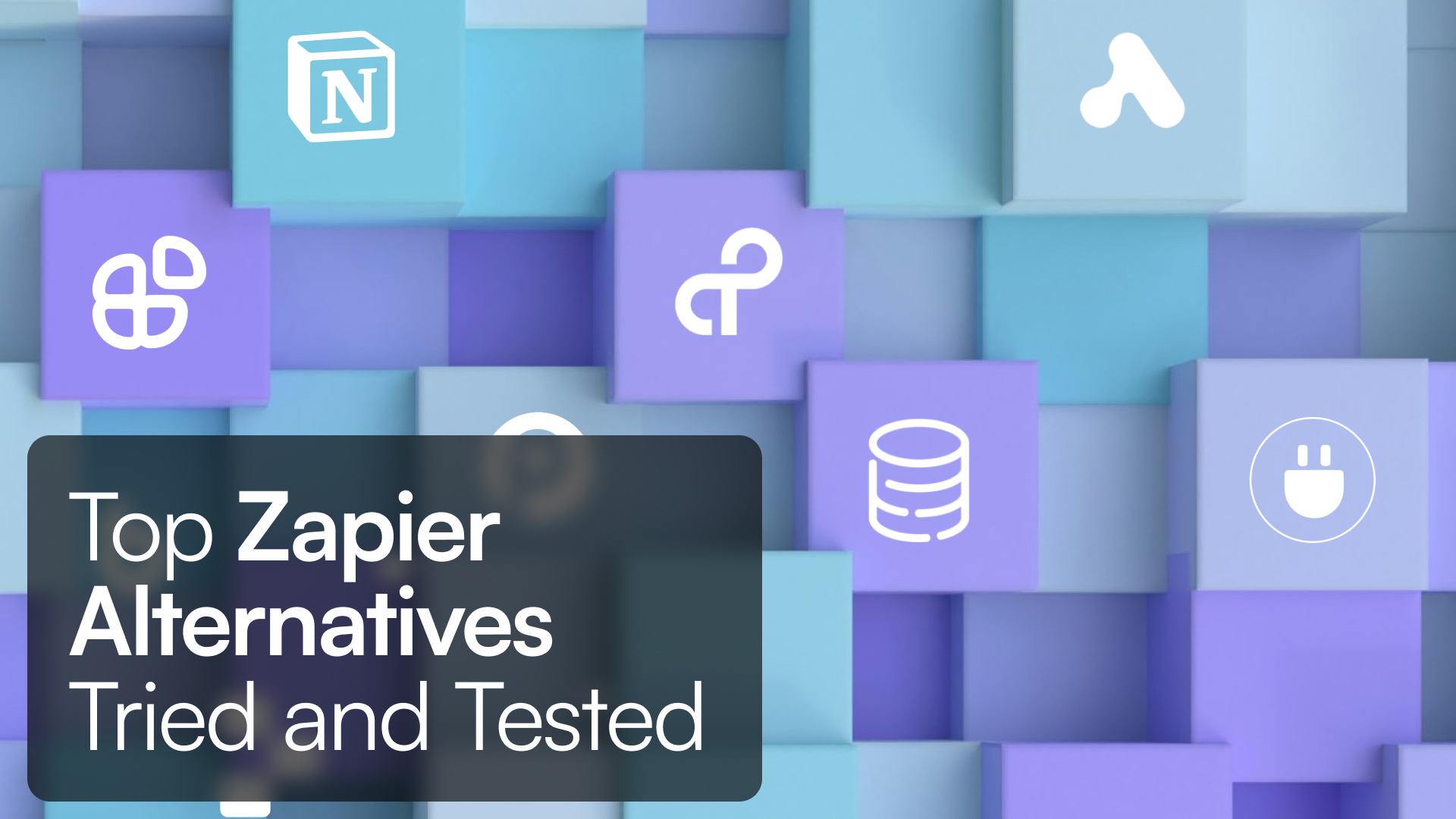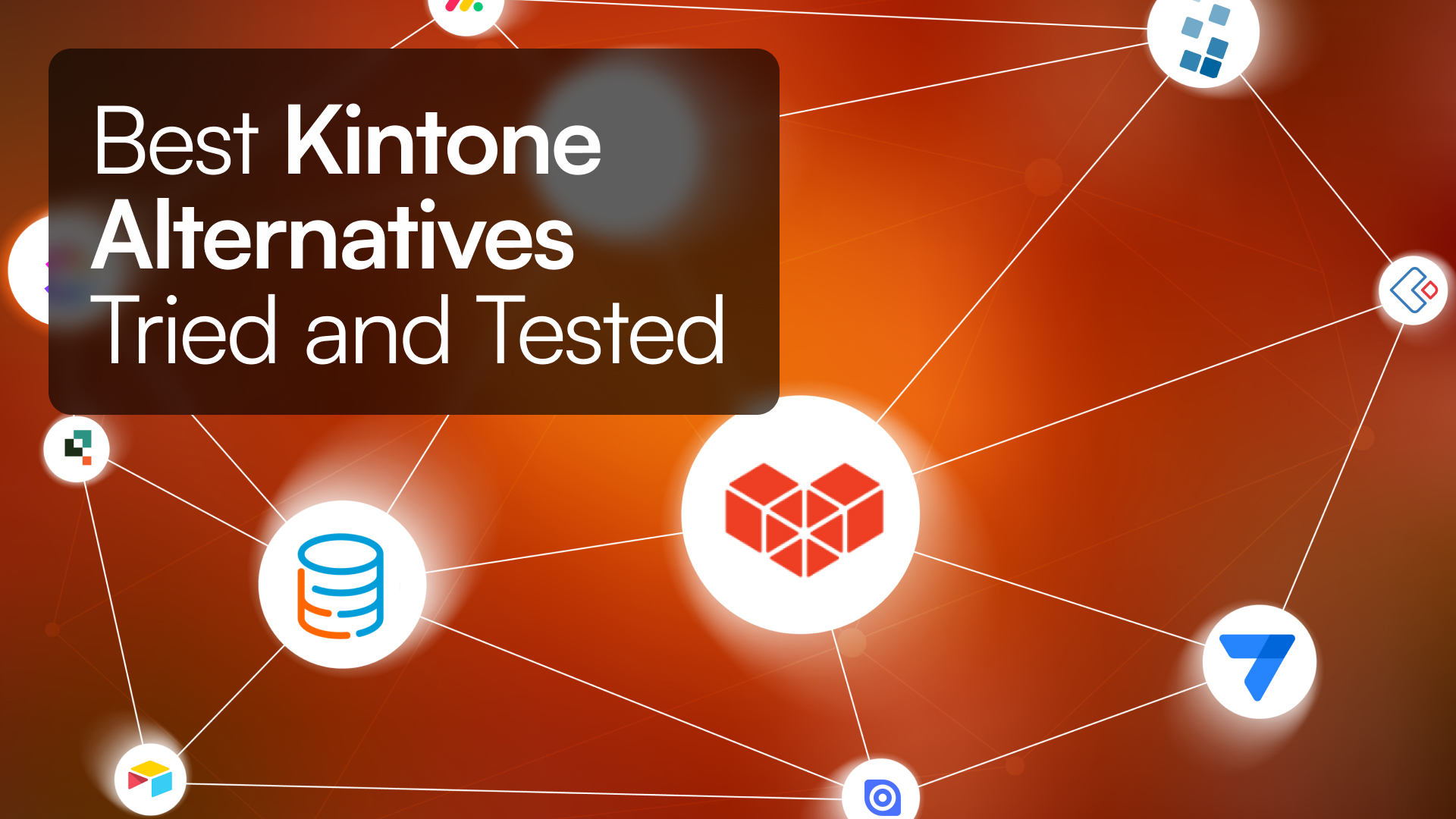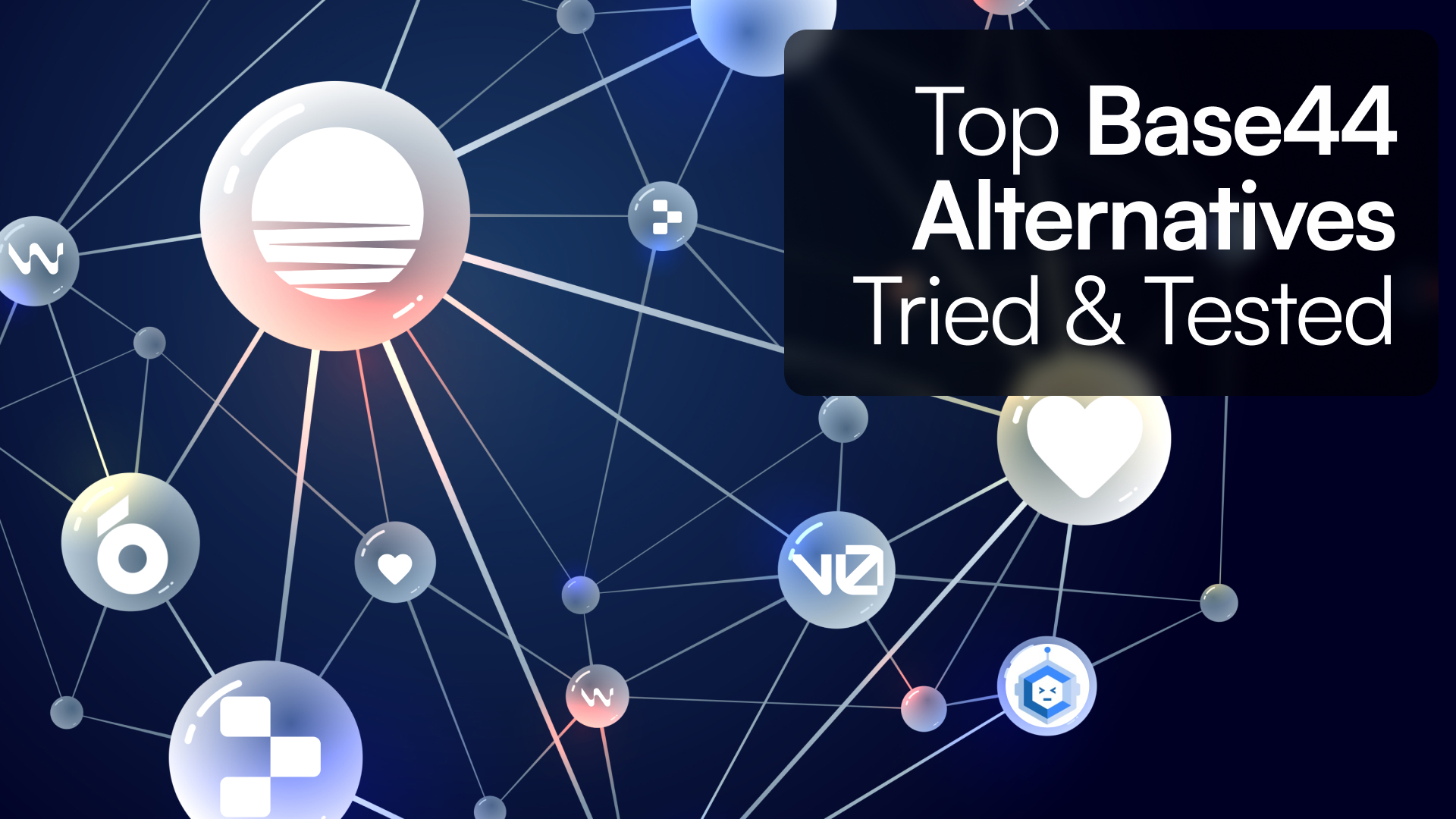Spreadsheets are stuck in the past—explore the smarter, faster tools built for today’s business.
Introduction
Spreadsheets have been a staple of data management for decades. Tools like Microsoft Excel and Google Sheets are great for simple calculations, lists, and organizing small datasets. But as your business grows and data needs evolve, traditional spreadsheets can become limiting. From scalability issues to complex workflows, it’s clear that many teams need more than just rows and columns.
If you're looking for better collaboration, automation, or advanced analytics, there are powerful alternatives that offer more functionality and flexibility. In this guide, we’ll explore 10 of the best spreadsheet alternatives for every use case—whether you're managing projects, analyzing large datasets, or building custom applications.
Why Look for Spreadsheet Alternatives?

There are several key reasons why people move away from traditional spreadsheets like Excel or Google Sheets:
- Scaling limitations: Spreadsheets can struggle with large datasets and multi-user collaboration, leading to performance issues and data conflicts.
- Manual processes: Automating complex tasks in spreadsheets often requires advanced programming knowledge or clunky workarounds.
- Lack of real-time collaboration: While Google Sheets allows for real-time collaboration, most traditional spreadsheet tools do not offer the depth of collaboration needed for modern workflows.
- Data security concerns: Spreadsheets often lack the security and compliance features necessary for handling sensitive data in enterprise environments.
By moving to a more robust solution, you can overcome these challenges and increase efficiency across your organization. Below, we’ll explore some of the best alternatives.
1. Tadabase: A Powerful Database-First Alternative 
Best For: Businesses that need a no-code platform to build complex, scalable applications.
Tadabase goes beyond just replacing your spreadsheet—it's a no-code platform designed for building fully customizable applications. Unlike spreadsheets, which are limited to static rows and columns, Tadabase allows you to create powerful relational databases, automate workflows, and build real-time reports, all from a drag-and-drop interface.
Key Features:
- Drag-and-drop interface for building custom apps
- Advanced workflow automation and triggers
- Role-based permissions for secure access control
- Integration with popular tools like Slack, Zapier, and Stripe
Pricing: Starts at $49/month (14 Day Free Trial)
When to use it: Tadabase is ideal for businesses, teams, and individuals needing a scalable, secure solution for managing complex data across departments and workflows.
2. ClickUp: A Project Management Powerhouse 
Best For: Teams needing project management and task tracking in addition to spreadsheet functionality.
ClickUp is a project management tool that incorporates spreadsheet-like views into its workflow management system. This makes it perfect for teams who need to manage tasks, timelines, and resources, but also want the familiar structure of a spreadsheet. You can switch between views like Gantt charts, lists, boards, and a table view to visualize your work in whatever format makes the most sense.
Key Features:
- Customizable views (Table, List, Gantt, etc.)
- Time tracking and resource allocation
- Real-time collaboration with comments and notifications
- Integration with over 1,000 apps including Slack, Trello, and Google Drive
Pricing: Free for basic plan; paid plans start at $5 per user/month
When to use it: If you need a versatile project management tool that also offers spreadsheet-like functionality for task tracking and reporting.
3. Airtable: Combining Spreadsheets and Databases 
Best For: Teams looking for a visually appealing and flexible data management tool.
Airtable is often described as a hybrid between a spreadsheet and a database. Its drag-and-drop interface allows you to organize information visually, making it perfect for teams who want to manage workflows, collaborate on projects, and create visually stunning dashboards. With customizable templates, Airtable can be used for anything from content calendars to customer relationship management (CRM).
Key Features:
- Flexible grid, gallery, and kanban views
- Customizable fields and templates for different use cases
- Real-time collaboration and commenting
- Automations and integrations with tools like Slack, Google Calendar, and more
Pricing: Free for basic usage; paid plans start at $10 per user/month
When to use it: Choose Airtable if you need a blend of spreadsheet simplicity and database flexibility for managing complex workflows across teams.
4. Zoho Sheet: A Free, Collaborative Spreadsheet Alternative 
Best For: Teams looking for a cloud-based, collaborative alternative to Google Sheets.
Zoho Sheet is part of the Zoho suite of applications, which includes everything from CRM to project management. Zoho Sheet is a cloud-based spreadsheet tool with real-time collaboration and automation features built-in. It offers advanced data cleaning tools powered by AI, making it a robust option for users who need more than just basic spreadsheet functionality.
Key Features:
- Real-time collaboration with user roles and permissions
- AI-powered data cleaning and automation tools
- Extensive integrations with Zoho’s ecosystem and third-party apps
- Version control for tracking changes
Pricing: Free
When to use it: When you need a free, cloud-based alternative to Google Sheets with additional automation and collaboration features.
5. Smartsheet: For Complex Project and Workflow Management 
Best For: Teams managing complex projects with automated workflows.
Smartsheet is a powerful platform that takes spreadsheets to the next level by combining data management with project and resource planning. It’s perfect for teams managing large projects or looking for better collaboration and workflow automation tools. Smartsheet’s Gantt charts, reporting features, and integration capabilities make it ideal for handling everything from simple task tracking to enterprise-level project management.
Key Features:
- Gantt charts, calendars, and card views for project management
- Automated workflows and approval processes
- Integration with tools like Microsoft Teams, Slack, and Jira
- Enterprise-grade security and compliance features
Pricing: Paid plans start at $7 per user/month
When to use it: Smartsheet is perfect for teams that need to automate complex workflows and manage large-scale projects with precision.
6. Notion: All-in-One Workspace with Database Capabilities 
Best For: Teams that need a versatile tool for notes, tasks, databases, and more.
Notion combines note-taking, task management, and databases into one flexible tool. While Notion’s databases aren’t as powerful as dedicated tools like Airtable or Tadabase, its versatility makes it ideal for small to medium-sized teams looking for an all-in-one workspace solution. You can create tables, add formulas, link pages together, and integrate tasks within the same platform.
Key Features:
- Customizable tables and databases
- Real-time collaboration with inline comments and shared workspaces
- Integrates with tools like Slack and Google Drive
- Flexible templates for tasks, wikis, project tracking, and more
Pricing: Free for personal use; paid plans start at $4 per user/month
When to use it: Notion is best for teams that want an all-in-one tool for managing tasks, notes, and databases in one cohesive platform.
7. LibreOffice Calc: The Open-Source Spreadsheet Solution 
Best For: Users looking for a free, open-source alternative to Microsoft Excel.
LibreOffice Calc is part of the LibreOffice suite and is one of the best open-source alternatives to Excel. It offers nearly all the functionality of Excel, including pivot tables, data charts, and complex formulas, without the price tag. While LibreOffice Calc lacks the cloud-based collaboration features of some other tools, it’s a powerful option for individual users or teams working locally.
Key Features:
- Advanced data analysis tools
- Compatibility with Excel files (both .xls and .xlsx)
- Support for complex formulas, pivot tables, and data visualization
- Open-source and completely free
Pricing: Free
When to use it: Use LibreOffice Calc if you need an Excel-like experience but want to avoid proprietary software costs.
8. GanttPRO: For Project Managers Who Need More Than Spreadsheets 
Best For: Project managers who need Gantt charts and timeline views.
GanttPRO is a dedicated project management tool designed to replace spreadsheet-based project plans. It offers an intuitive Gantt chart interface that helps teams track progress, manage resources, and collaborate on tasks. If you’ve been using Excel for project planning, GanttPRO offers a far more streamlined and powerful experience.
Key Features:
- Intuitive Gantt chart interface
- Task assignments, dependencies, and critical path tracking
- Collaboration features with team chat and file sharing
- Export to Excel or PDF for reporting
Pricing: Starts at $7.99 per user/month
When to use it: If you’re a project manager looking for a more robust solution than Excel for timeline and resource management.
9. Quip: Collaborative Document and Spreadsheet Tool 
Best For: Teams that want to combine documents, spreadsheets, and real-time collaboration.
Quip, owned by Salesforce, integrates documents and spreadsheets in a single platform. It's designed for collaboration, with real-time editing, commenting, and chat. Quip is especially useful for teams that work on shared documents and spreadsheets simultaneously.
Key Features:
- Real-time collaboration on documents and spreadsheets
- Built-in chat and commenting tools
- Integration with Salesforce for CRM-driven workflows
- Version history and tracking
Pricing: Starts at $10 per user/month
When to use it: Quip is ideal for teams that need seamless collaboration across documents and spreadsheets.
10. Coda: A Document That’s as Powerful as a Database 
Best For: Teams looking for a flexible tool to combine text, tasks, and data.
Coda takes the idea of a document and transforms it into a powerful database. With Coda, you can create tables, build custom workflows, automate tasks, and link data across multiple pages. Its flexibility makes it a great option for teams that want to combine the simplicity of a document with the power of a database.
Key Features:
- Flexible tables that act as databases
- Automation tools for streamlining workflows
- Integration with third-party apps like Slack and Zapier
- Drag-and-drop interface for building customized documents
Pricing: Free for basic usage; paid plans start at $10 per user/month
When to use it: Choose Coda if you need a highly customizable tool that can act as both a document and a database.
Conclusion
Choosing the right alternative depends on your specific needs and use cases. If you're managing complex workflows and need powerful data management, Tadabase or Smartsheet might be the perfect fit. For project management with a focus on collaboration, ClickUp or Airtable can provide a flexible solution. And if you're looking for a free option with advanced features, Zoho Sheet and LibreOffice Calc are excellent choices.
No matter your needs, moving beyond spreadsheets can help your team work more efficiently, securely, and collaboratively.
Frequently Asked Questions
1. What are the main reasons to switch from spreadsheets like Excel or Google Sheets to an alternative?
Switching from traditional spreadsheets to a more advanced solution is often driven by their limitations, particularly as businesses grow. Common reasons to switch include:
- Collaboration: Spreadsheets can become cumbersome when multiple people are editing simultaneously, leading to version control issues. Alternatives like Tadabase, Airtable, and ClickUp are designed for real-time collaboration, allowing teams to work together without conflicts.
- Automation: Traditional spreadsheets require manual data entry and manipulation, whereas tools like Tadabase and Smartsheet offer built-in automation features to streamline repetitive tasks such as sending notifications or updating data based on specific triggers.
- Scalability: Spreadsheets struggle with large datasets or complex workflows. Tadabase and Airtable, which are designed as scalable platforms, handle these challenges with ease through relational databases and customizable views.
- Security: Spreadsheets often lack advanced security features like role-based access control and encryption, which are crucial for businesses handling sensitive data. Platforms like Tadabase and Smartsheet offer these security capabilities to protect your information.
2. What are some key features to look for when choosing a spreadsheet alternative?
When selecting an alternative, consider these essential features based on your specific needs:
- Collaboration Tools: Look for real-time collaboration, commenting, and team permissions, which are well supported in platforms like Tadabase, Airtable, and ClickUp.
- Automation: Automation of workflows, data processing, and reporting is vital for efficiency. Tadabase, Smartsheet, and Airtable offer robust automation features.
- Integrations: Ensure the tool integrates with other business applications you rely on. Tadabase, Airtable, and ClickUp offer extensive integration capabilities through APIs and platforms like Zapier.
- Customization: Depending on your business needs, you may require tools that allow deep customization, such as Tadabase’s no-code app builder, Airtable’s templates, or ClickUp’s task views.
- Security: Platforms like Tadabase, Smartsheet, and Airtable offer robust security protocols, such as role-based access, audit trails, and data encryption, which are crucial for protecting your data.
- Scalability: For growing businesses, tools like Tadabase and Smartsheet are designed to scale seamlessly as your data and process complexity increase.
3. How do I know which spreadsheet alternative is right for my business?
Choosing the right tool depends on your business’s specific needs:
- Project Management: If your team uses spreadsheets for task tracking, tools like Tadabase, ClickUp, or Smartsheet can offer better organization with built-in task management and automation features.
- Database Management: For businesses managing complex datasets, Tadabase and Airtable allow you to create relational databases, which provide more power and flexibility than traditional spreadsheets.
- Simple Data Collaboration: If you need a basic, cloud-based solution for collaborative data management, Tadabase, Zoho Sheet, and Google Sheets are all excellent options, with real-time collaboration features.
- Automation and Workflows: If automation is a priority, Tadabase, Smartsheet, and Airtable offer powerful built-in automation tools to trigger actions based on data changes or user inputs.
4. Can I migrate my existing Excel or Google Sheets data to these alternatives?
Yes, most spreadsheet alternatives support easy migration of your existing data:
- Tadabase: Offers a straightforward data import process, allowing you to migrate spreadsheets into relational databases while preserving data relationships and formatting.
- Airtable: Supports importing data from CSV and Excel files, which can be structured within customizable templates.
- ClickUp: Allows for easy data import from CSV or Excel files, making it simple to transition your tasks and spreadsheets into a more structured environment.
- Zoho Sheet: Supports importing spreadsheets from Excel or Google Sheets, maintaining your data’s structure, including formulas and charts.
5. Are there free alternatives to Excel that offer comparable functionality?
Yes, several free alternatives offer comparable functionality to Excel, and in some cases, additional features:
- Google Sheets: A free, cloud-based alternative with robust collaboration features. It integrates well with other Google Workspace tools and supports advanced functions.
- Zoho Sheet: A free option that offers collaboration, automation, and integrations, making it a strong competitor for Google Sheets.
- LibreOffice Calc: A free, open-source alternative to Excel that supports complex formulas, pivot tables, and data visualization.
- Tadabase: While not completely free, Tadabase offers a tiered pricing model, including a free plan that provides access to powerful customization features and basic automation for smaller projects or individuals.
6. Can spreadsheet alternatives handle large datasets better than traditional spreadsheets?
Yes, many alternatives are specifically designed to handle large datasets more effectively than traditional spreadsheets:
- Tadabase: Built to manage large datasets through its relational database structure, making it easy to automate workflows and scale efficiently as data grows.
- Smartsheet: Provides scalability for managing large projects and datasets, particularly when combined with its automation and reporting tools.
- Airtable: While it offers a user-friendly, spreadsheet-like interface, Airtable’s database functionality allows for better handling of larger datasets, especially when data needs to be categorized or linked across multiple tables.
7. How do spreadsheet alternatives handle complex formulas and data analysis?
Most spreadsheet alternatives support complex formulas and advanced data analysis in different ways:
- Tadabase: Provides built-in formula support and workflow automation for processing complex data within relational databases.
- Google Sheets: Supports a wide range of functions and offers custom scripts via Google Apps Script, which allows for advanced data manipulation and automation.
- Zoho Sheet: Offers advanced functions and AI-powered data cleaning, which can help streamline data analysis and enhance accuracy.
- Smartsheet: Though primarily a project management tool, Smartsheet offers formula support and can integrate with business intelligence platforms for more sophisticated data analysis.
8. What kind of security features do these alternatives offer compared to spreadsheets?
Alternatives to spreadsheets often offer far stronger security features, including data encryption and role-based access control:
- Tadabase: Offers enterprise-grade security features, including role-based access, two-factor authentication, data encryption, and audit trails, ensuring that only authorized users can access sensitive data.
- Smartsheet: Provides role-based permissions, single sign-on (SSO), and compliance with enterprise-level security standards like HIPAA and GDPR.
- Airtable: Offers granular permissions, audit trails, and encryption to protect data, making it a secure option for collaboration across teams.
- ClickUp: Ensures secure collaboration through user roles, permission settings, and integrations with SSO providers, suitable for team environments where sensitive data is shared.
9. What are some of the best alternatives for teams working on collaborative projects?
For teams focused on collaboration, the best alternatives include:
- Tadabase: Offers a powerful platform for team collaboration with real-time data updates, customizable apps, and secure role-based access control, making it ideal for businesses handling complex workflows and data.
- Airtable: Known for its flexibility and collaborative features, Airtable allows teams to collaborate in real time while customizing their workflows to meet specific needs.
- ClickUp: Provides a wide range of views and task management features, making it an excellent tool for teams that need to stay aligned on projects while managing tasks efficiently.
- Zoho Sheet: Offers real-time collaboration, making it a great choice for teams working on shared data projects in a cloud environment.
10. Can spreadsheet alternatives integrate with other tools my business already uses?
Yes, most top spreadsheet alternatives offer extensive integrations with other popular business tools:
- Tadabase: Integrates with various third-party applications through APIs and tools like Zapier, allowing you to connect with CRMs, communication platforms, and other enterprise tools.
- Smartsheet: Provides integrations with popular applications such as Slack, Microsoft Teams, Google Workspace, and Jira, enhancing workflow automation and collaboration.
- ClickUp: Integrates with over 1,000 apps, including Trello, Slack, Google Drive, and Salesforce, making it a versatile tool for businesses that need to maintain data flow across different platforms.
- Airtable: Directly integrates with many tools like Slack, Dropbox, and Google Calendar, as well as through Zapier for more complex automation and workflow management.







